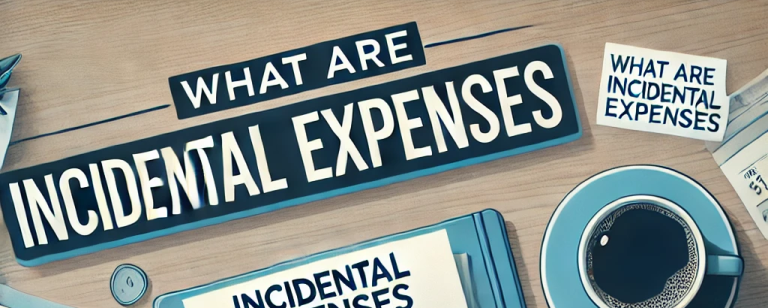Incidental expenses are small costs that occur as a result of business or personal activity but are not necessarily part of the main expense. The incidental expenses occur at any time and are needed to be able to finish a big task or activity. Typically, incidental expenses are cheap items, but when the total is added, it might significantly affect a business’s or individual’s finances. Understanding this is important for budgeting and accurate financial reporting.
What Are Incidental Expenses (IE)?
Incidental Expenses (IE) are relatively minor costs that are secondary to the core activity in a business or personal venture. They are typically incurred alongside larger projects or activities, but they do not themselves constitute the primary purpose or activity. For business activities, examples of incidental expenses could include office supplies, costs of travel-related items, such as meals and taxi, tips, and any other low-value costs supporting the fundamental purpose.
Common Examples of Incidental Expenses
- Office Supplies: Pens, paper, and printer ink.
- Travel Costs: Small travel-related expenses such as parking fees, local transportation, or meals during a business trip.
- Employee Perks: Small bonuses or perks for employees that are not part of their regular wages, like coffee or snacks.
- Meeting and Event Costs: Costs for refreshments or minor supplies during meetings or conferences.
These expenses are not typically large, but businesses and individuals need to track them to manage their finances and ensure accurate accounting.
Why Are Incidental Expenses Important?
- Budgeting: Understanding incidental expenses is crucial for proper budgeting. Even small expenses can add up, so keeping track of them helps in controlling costs.
- Taxation: Some incidental expenses may be deductible for tax purposes, depending on the jurisdiction and the nature of the expenses.
- Financial Planning: Businesses and individuals who neglect incidental costs may find their budgets strained. Properly managing incidental expenses ensures financial stability.
Understanding Incidental Expenses
Incidental Expenses are important to be differentiated from major business expenses. Incidental expenses are minor in nature and incurred as a result of the business or personal activities, whereas direct costs are directly related to a product or service, such as raw materials or wages. They support the core operations but do not directly contribute to the production of goods or services.
Characteristics of Incidental Expenses
- Minor in Nature: Incidental expenses are typically small and infrequent but necessary for the completion of a task or service.
- Indirect to Main Operations: They are not the primary focus of the business or activity but occur as a side effect of operations.
- Difficult to Budget: Since they are often unpredictable, businesses can find it challenging to estimate incidental expenses in advance.
Types of Incidental Expenses
These expenses, while necessary, do not contribute directly to the product or service and are usually accounted for separately in financial reports to keep the main budget focused on significant costs.
- Travel Expenses: Costs incurred during business travel, such as tips for service personnel, taxi fares, and minor meals.
- Entertainment and Hospitality: Small costs related to client entertainment or business lunches.
- Administrative Costs: Small expenses related to office maintenance, such as stationery, phone bills, and minor repairs.
Why Track Incidental Expenses?
In summary, while incidental expenses might seem insignificant on their own, they are an important aspect of both personal and business financial management. Tracking incidental expenses is important for:
- Accurate Financial Reporting: Helps businesses maintain a clear and accurate financial record.
- Cost Control: Identifies areas where minor, unnecessary expenses can be cut to improve profitability.
- Tax Deduction: Certain incidental expenses may qualify for tax deductions if they are business-related.
Taxes and Deductions for Incidental Expenses
Among the critical aspects of incidental expenses is knowing how they relate to taxes and deductions. Some incidental expenses can be deducted from taxable income if they are regarded as ordinary and necessary to a business. This can help reduce the taxable income of a business or an individual and thereby decrease tax liabilities.
Deductibility of Business-Related Incidental Expenses
For businesses, these are considered incidental expenses for travel, meals, and entertaining clients, which can be tax-deductible, provided they are directly associated with business operations. But the IRS (or local tax authority) usually requires that they be documented and reasonable.
- Travel Expenses: If travel is for business purposes, incidental costs such as parking fees, tolls, or meals during the trip may be deductible.
- Meals and Entertainment: Small costs for meals and entertainment incurred while discussing business with clients may be partially deductible.
- Office Supplies: Minor office supplies like pens, paper, or cleaning supplies may also be deductible.
Rules for Deductions
- Receipts and Documentation: To claim incidental expenses as deductions, proper documentation, such as receipts and records, must be maintained.
- Percentage Limits: Some expenses, such as meals and entertainment, may only be deductible up to a certain percentage of the cost (e.g., 50% for meals).
- Business-Only Costs: Personal incidental expenses (e.g., personal meals or travel costs) are not deductible.
Tax Filing
At tax filing time, businesses and individuals report incidental expenses on forms or schedules that apply to their reporting. Small businesses will report these on Schedule C, while large businesses have these recorded under various expense categories in the financial statements.
How Businesses Deduct Incidentals?
For businesses, this will be an important management tool in terms of financing operations, especially for those who regularly incur minor costs on daily operations. Proper tracking and reporting of incidental expenses allow businesses to reduce their taxable income and avoid overpaying in taxes.
Accurate Record Keeping
All direct expenses require the businesses to keep an accurate record so that their incidentals can be deducted accordingly. This includes storing receipts, invoices, and more to show the nature of the expense and its connection to the business’s operations.
Common Types of Deductible Incidentals
- Travel-Related Costs: Expenses like transportation, accommodation, and meals during business trips.
- Office Expenses: Minor office supplies, including paper, pens, and postage costs.
- Client Entertainment: Meals or small gifts provided to clients as part of business development activities.
Maximizing Deductions
A company should review its incidental costs often to ensure that all qualifying costs are being deducted. A company can ensure incidental expenses are properly documented and filed to maximize the deduction of incidental expenses by hiring an accountant or tax advisor.
Conclusion
Incidental costs are incidental and minor, yet vital costs related to the operation of a business or personal activities. Though unrelated to the generation of either goods or services, tracking these costs is necessary for smooth financial management. With incidental expense tracking, businesses can reduce costs, maintain accuracy in financial records, and claim accurate tax deductions. Whether it’s traveling, office supplies, or minor business-related entertainment, keeping an eye on those small expenses can make a great difference in overall profitability and tax efficiency.
What are Incidental Expenses ? FAQs
What are Incidental Expenses?
Incidental expenses are minor costs that occur in the course of business or personal activities, supporting the primary operations but not directly contributing to the main activity.
How do Incidental Expenses differ from Major Business Expenses?
Unlike major expenses that directly contribute to production or service delivery, incidental expenses are smaller, secondary costs that support daily operations but don’t form the core cost structure of a business.
Can Incidental Expenses be deducted for tax purposes?
Yes, many incidental expenses, such as business travel or meals, may be deductible from taxable income if they are properly documented and directly related to business activities.
What types of Incidental Expenses are deductible for businesses?
Examples of deductible incidental expenses include travel costs, office supplies, and client entertainment, as long as they meet the IRS guidelines for business expenses.
How can businesses manage Incidental Expenses?
Businesses can manage incidental expenses by keeping accurate records, regularly reviewing costs, and working with accountants to ensure deductions are properly claimed and reported.


